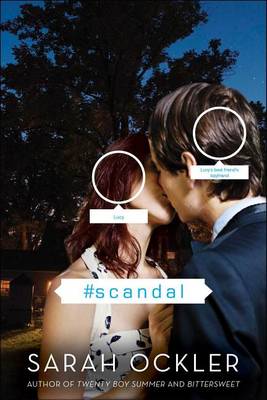Reviewed by girlinthepages on
#scandal was not initially on my TBR list. I was at the library picking up a hold when #scandal caught my eye on the newer-releases shelf, and having never read anything by Sarah Ockler I decided to give it a shot. Despite many readers warning me that #scandal is not Ocklers’ best novel, I rather enjoyed Ockler’s tackling of cyber bullying in this novel.
#scandal addresses a phenomena that’s all too common today- compromising party pics get uploaded online the morning after. That’s the catalyst for this novel, with Lucy’s cell phone getting stolen and her ending up taking the blame for someone uploading post-prom pics from her stolen phone. Lucy faces the fallout from her own friends, her classmates, her school administration, and other students’ parents, and the book takes on kind of a silly “whodunnit” vibe where she teams up with the stereotypical high school tropes (nerdy newspaper editor, anti-establishment club kids, etc) to clear her name. Meanwhile, there’s an online personality “Miss Demeanor” who adds fuel to the fire on her “scandal” page (gossip girl, anyone?).
I couldn’t figure out whether this book was supposed to be a satire or not. The characters sometimes speak in “texting” type lingo and Lucy has a lot of sarcastic asides. Couple this with the stereotyped classmates, a costume-party prom, a famous actress who happens to be an alumnus from their high school, the ridiculous slut shaming (someone creates a fan page in revenge called “Juicy Lucy”) and a school principle who can’t even manage her own social media, and the novel had was so ridiculous in some points it was absurd what was happening or being said. Yet once I decided to view this novel in a satirical light, I found myself enjoying the story much more. As a social commentary, this book brings up a lot of issues, such as teens paralleling the paparazzi influenced celebrity life and over-documenting their lives to the point of mutually assured social destruction. It also portrayed how the cycle of cyber-bullying is never ending, as Lucy the “bully” (or rather, as she’s framed) quickly becomes victimized through revenge Facebook pages, nasty altered images of her, and harassing threats and comments constantly left on her profiles. The alternative group (e)VIL, the anti-technology group of misfits at Lucy’s high school who reject all technology and jump on every conspiracy theory, may be painted as absurd but the other characters begin to see their point- technology allows the nastiest, most vengeful side of people to come out.
One thing that really frustrated me throughout the novel was Lucy’s constant neglect to stand up for herself. Since one of the pictures that got uploaded was of her kissing her best friend’s boyfriend (the situation isn’t even as bad as it seems, as you’ll find out later in the novel) she feels guilty and as if she “deserves” all of the consequences, harassment, and bullying. While she definitely made an error in judgement kissing Cole (who receives less than a quarter of the harassment as she does), it’s not an excuse for her to take the bullying and slut shaming lying down, and she neglects 90% of the opportunities to stand up for herself or to clear her name, and it’s constantly her friends defending her. So while I liked that the book addressed cyber bullying, it dropped the ball by having a protagonist who allowed herself to be railroaded by unfair harassment.
Overall: Despite the fact that this book had too many issues to juggle (cyber bullying, slut shaming, a romance, family issues, and a brief side plot of sexual harassment) I found myself to enjoy Ockler’s satirical approach (if that in fact was what she meant to do) and found myself continuing the book because I wanted to find out who made the reputation-ruining move for so many people by simply pushing an “upload” button. I think there’s probably better books out there that tackle cyber bullying and harassment but Ockler’s book is an OK addition to the YA shelves, suffering mainly due to a lack of confidence from her protagonist.
This review was originally posted at Girl in the Pages
Reading updates
- Started reading
- 21 August, 2014: Finished reading
- 21 August, 2014: Reviewed
